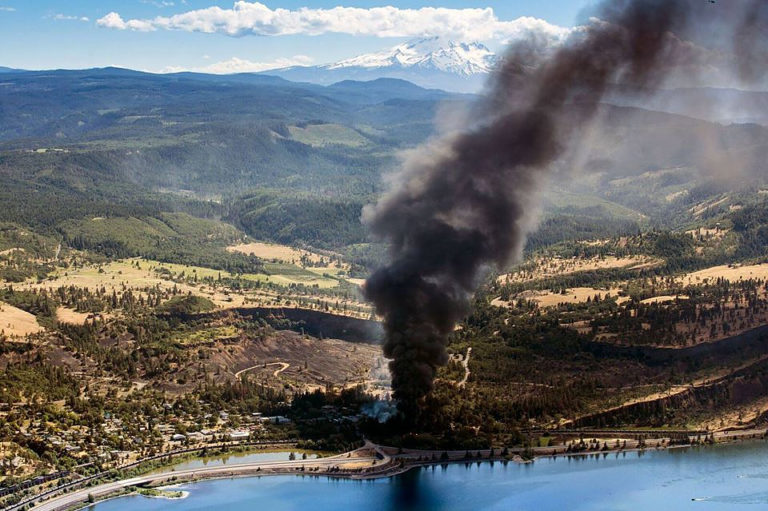
On Friday, June 3, a train carrying Bakken crude oil, which was fracked in North Dakota and bound for a refinery in Puget Sound, derailed and exploded in Mosier, Oregon. The derailment spilled 42,000 gallons of Bakken crude oil, some of which leached into the nearby Columbia River. Mosier’s wastewater treatment plant was shut down due to damage and contamination and its water reserves were quickly exhausted to fight the flames and cool the overheating train cars. A nearby school, filled with 200 children, was quickly evacuated and the students were unable to return for the final days of their school year. Due to the heroic effort of firefighters, and some good fortune, there were no fatalities, and of the 96 train cars hurtling down the tracks, only 16 derailed, with 4 cars igniting and leaking oil.
[supporting_document]
Many are saying that Mosier is lucky to have not seen more extensive damage and injury. According to Mosier Fire Chief Jim Appleton, a windy day, which is the norm in the Columbia Gorge, could have burned down the town and the neighboring forests. “Only extraordinary luck spared us from a devastating calamity,” he said. While Mosier was fortunate in this instance, it is frightening to think that a situation involving a massive fire, evacuations, sewage system and drinking water shut downs, and oil contamination could be considered “lucky.”

Every time one of these oil trains rolls through a town, along a river, or over a bridge, there is a risk of disaster. Just three years ago, an oil train derailed in Lac Megantic, Quebec and killed 47 people. The federal government has predicted that these types of oil trains will derail an average of ten times per year over the next two decades, causing more than $4 billion in damages and threatening lives. The government seems to accept that these catastrophes are going to happen and they are crossing their fingers that they will be “lucky” like Mosier rather than “unlucky” like Lac Megantic.
Shortly after the derailment, Appleton voiced his deep concern, saying, “I hope that this becomes death knell for this mode of shipping this cargo. I think it’s insane. I’ve been very hesitant to take a side up to now, but with this incident, and with all due respect to the wonderful people that I’ve met at Union Pacific, shareholder value doesn’t outweigh the lives and happiness of our community.”
We cannot accept the inevitability of these derailments. We must call on our elected leaders to stand with communities like Mosier, and use all of their authority to stop reckless oil trains. Waterkeepers have been fighting dangerous oil trains and advocating for better rail infrastructure for years. Lucky or unlucky, these disasters are a threat to communities across the country and they must be prevented.